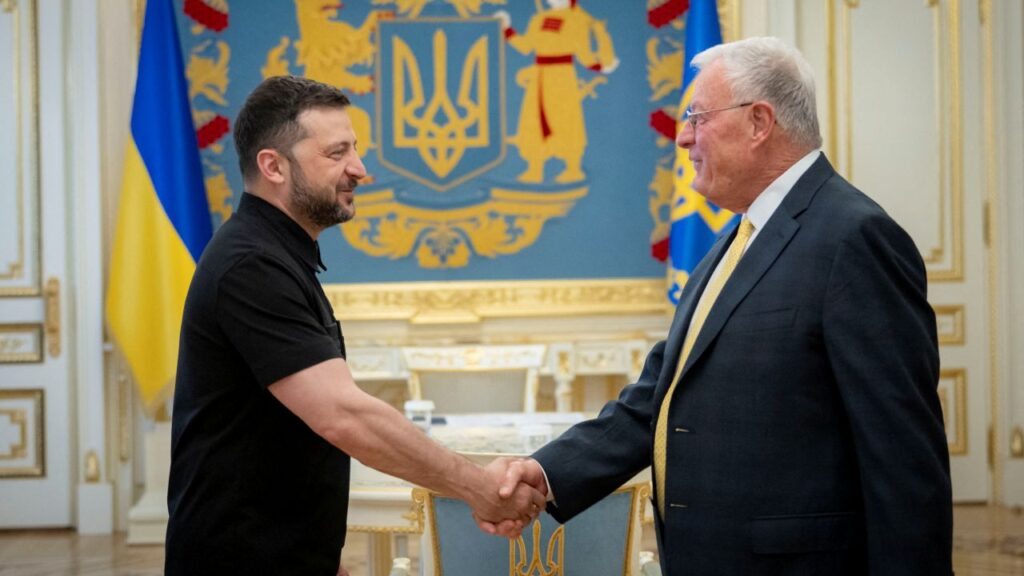An undated image provided by Google Quantum AI of their quantum computer chip. Google unveiled a new quantum computer based on a chip called Willow that they say needs less than five minutes to perform a mathematical calculation that one of the world’s most powerful supercomputers could not complete in 10 septillion years, a length of time that exceeds the age of the known universe. (Google Quantum AI via The New York Times)

- Google’s new quantum computer, Willow, completed a calculation in under five minutes that would take traditional supercomputers 10 septillion years.
- Google’s quantum computer surpasses the error correction threshold, signaling progress toward practical applications like drug discovery and AI.
- Experts believe quantum computing will eventually revolutionize industries, though its full potential is still years away due to error issues.
Share
|
Getting your Trinity Audio player ready...
|
In 2019, a team of Google researchers said they had built a machine capable of performing tasks that were not possible with traditional supercomputers. They described this machine, called a quantum computer, as a turning point in the evolution of information technology.
Some scientists disputed the claim. In the years since, as traditional supercomputers grew more powerful, they matched the feats of Google’s quantum computer.
On Monday, Google unveiled a new quantum computer that may end this back-and-forth race with traditional machines and that points to a future in which quantum computers could drive advances in areas like drug discovery and artificial intelligence.
Related Story: Google Touts Quantum Computing Milestone
Google Boasts Quantum Computer Speed
Google said its quantum computer, based on a computer chip called Willow, needed less than five minutes to perform a mathematical calculation that one of the world’s most powerful supercomputers could not complete in 10 septillion years, a length of time that exceeds the age of the known universe.
Quantum computing — the result of decades of research into a type of physics called quantum mechanics — is still an experimental technology. But Google’s achievement shows that scientists are steadily improving techniques that could allow quantum computing to live up to the enormous expectations that have surrounded this big idea for decades.
“When quantum computing was originally envisioned, many people — including many leaders in the field — felt that it would never be a practical thing,” said Mikhail Lukin, a professor of physics at Harvard University and a co-founder of quantum computing startup QuEra. “What has happened over the last year shows that it is no longer science fiction.”
Many other tech giants, including Microsoft, Intel and IBM, are building similar technology as the United States jockeys with China for supremacy in this increasingly important field. As the United States has pushed forward, primarily through corporate giants and startup companies, the Chinese government has said it is pumping more than $15.2 billion into quantum research.
The mathematical calculation performed by Google’s machine was a test designed solely to gauge the progress of quantum computing — not a task that could be useful in other fields, like medicine. Though researchers believe that quantum computers will one day make today’s classical machines look archaic, the technology still makes too many mistakes to be truly useful.
Google’s quantum computer also uses a form of error correction — a way of reducing mistakes — that could allow this kind of machine to reach its potential. In a research paper published Monday in the science journal Nature, Google said its machine had surpassed the “error correction threshold,” a milestone that scientists have been working toward for decades.
That means quantum computers are on a path to a moment, still well into the future, when they can overcome their mistakes and perform calculations that could accelerate the progress of drug discovery. They could also break the encryption that protects computers vital to national security.
“What we really want these machines to do is run applications that people really care about,” said John Preskill, a theoretical physicist at the California Institute of Technology who specializes in quantum computing. “Though it still might be decades away, we will eventually see the impact of quantum computing on our everyday lives.”
Quantum Computers Defy Common Sense
A traditional computer like a laptop or a smartphone stores numbers in silicon chips and manipulates those numbers, adding them, multiplying them and so on. It performs these calculations by processing “bits” of information. Each bit holds either a 1 or a 0.
But a quantum computer defies common sense. It relies on the mind-bending ways that some objects behave at the subatomic level or when exposed to extreme cold, like the exotic metal that Google chills to nearly 460 degrees below zero inside its quantum computer.
Quantum bits, or “qubits,” behave very differently from normal bits. A single object can behave like two separate objects at the same time when it is either extremely small or extremely cold. By harnessing that behavior, scientists can build a qubit that holds a combination of 1 and 0. This means that two qubits can hold four values at once. And as the number of qubits grows, a quantum computer becomes exponentially more powerful.
Scientists first proposed this kind of machine in the 1980s. But qubits are fragile, which means that stringing even a few of them together requires years of work.
Labs in academia, industry and government have used a wide variety of techniques to build these machines, including systems based on particles of light or tiny charged particles trapped in electromagnetic fields. Like IBM and Intel, Google builds “superconducting qubits,” where certain metals are cooled to extremely low temperatures.
With its latest superconducting computer, Google has claimed “quantum supremacy,” meaning it has built a machine capable of tasks that are beyond what any traditional computer can do. But these tasks are esoteric. They involve generating random numbers that can’t necessarily be applied to practical applications, like drug discovery.
Google and its rivals are still working toward what scientists call “quantum advantage,” when a quantum computer can accelerate the progress of other fields like chemistry and artificial intelligence or perform tasks that businesses or consumers find useful. The problem is that quantum computers still make too many errors.
But scientists have spent nearly three decades developing techniques — which are mind-bending in their own right — for getting around this problem. Now, Google has shown that as it increases the number of qubits, it can exponentially reduce the number of errors through complex analysis.
Experts believe it is only a matter of time before a quantum computer reaches its vast potential.
“People no longer doubt it will be done,” Lukin said. “The question now is: When?”
—
This article originally appeared in The New York Times.
By Cade Metz/Google Quantum AI
c. 2024 The New York Times Company
RELATED TOPICS:
Categories

California Discourages Wild Mushroom Foraging After Fatal Outbreak


















